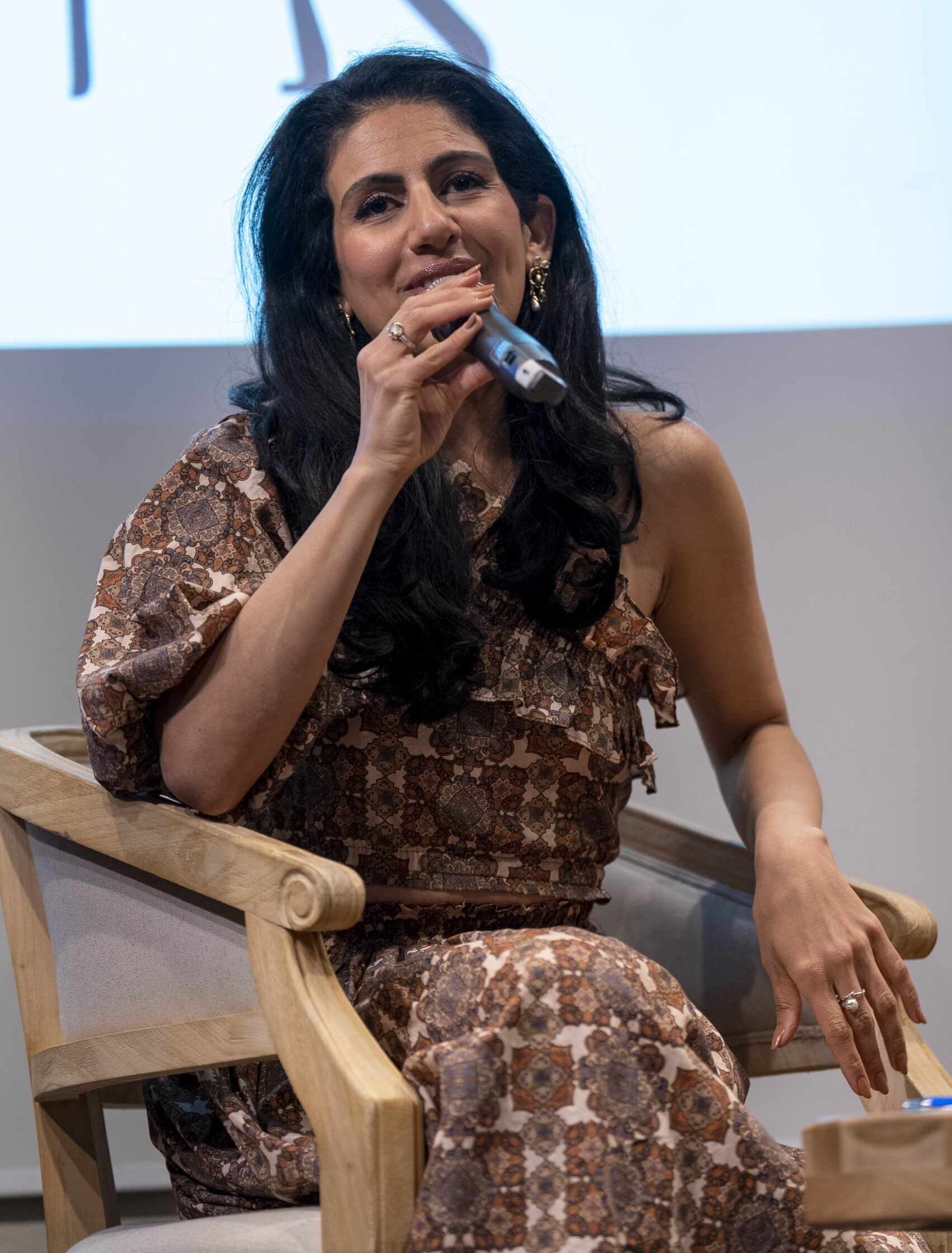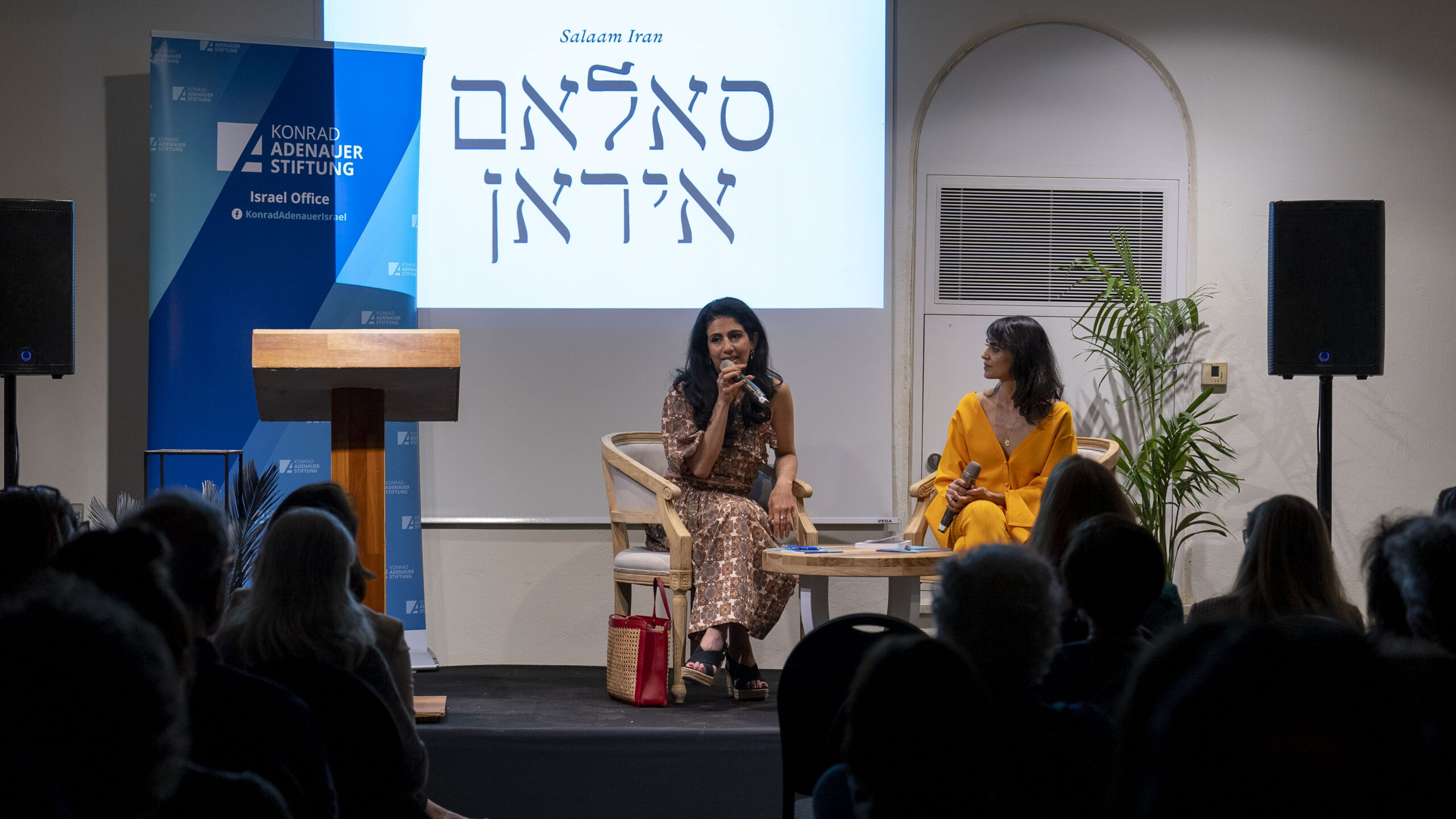Swedish Iranian Author, Iranian Israeli Actor Discuss Challenges of Diaspora Identity
In a conversation with actor Liraz Charhi at the Jerusalem Writers Festival, author Golnaz Hashemzadeh Bonde discussed her family’s move from Iran to Sweden and the process of coming to terms with her multifaceted identity
Swedish Iranian author and nonprofit founder Golnaz Hashemzadeh Bonde sat down for a conversation with Israeli actor Liraz Charhi at the Jerusalem Writers Festival last Wednesday.
The Iranian-born writer of the 2017 novel What We Owe told the captivated audience about fleeing Iran with her family as a young child, settling in Sweden as refugees, and the struggle with personal identity she experienced as a result.
I think my parents thought that the current regime was temporary
“I do remember the bombings in Iran, running to shelters with my parents. I remember the morning when my father had fled—he went first,” Hashemzadeh Bonde told The Media Line, recounting her earliest memories of Iran.
The 40-year-old author of three award-winning books, founder of a successful nonprofit, and mother of two was born to parents she described as “revolutionary” in Iran’s capital, Tehran. The family fled in 1985, seven years after the 1978 uprising. Hashemzadeh Bonde was 3 years old.
“I think my parents thought that the current regime was temporary,” she said.
The Jerusalem Writers Festival is a weeklong event held every year among the cobbled streets of Jerusalem’s Mishkenot Sha’ananim neighborhood. The event features talks and performances from some of the world’s most prominent authors.
Speaking with Liraz Charhi, an actor of Iranian descent from the Israel television series Tehran, Hashemzadeh Bonde described the Iranian revolution as a defining moment in her parents’ lives.
“I think the highlight of my parents’ life was the revolution, walking the streets, having a purpose,” she said. “They had such a sense of community, purpose, hope.”
Her parents had had a romanticized view of the revolution, she said. She recounted her mother watching videos of the revolution in the last months of her life and suddenly realizing the stakes of what she had participated in.
“It was as if at this point in her life, she realized what it was. She was like, we could have been killed,” she said.
Hashemzadeh Bonde’s parents died young, at 50 and 53, something she attributes to the trauma they experienced. Her mother’s cancer, she said, was “symbolic of how pain can stay in your body and grow.”
Her novel What We Owe, which won the Dayton Literary Peace Prize in fiction, examines the influence that a traumatic experience can have, even after someone has left the site of that trauma behind. The book focuses on the character Nahid, whose cancer diagnosis prompts her to recount her childhood in Iran and her move to Sweden.
Hashemzadeh Bonde’s relationship with Iran is complex. Her longing for and idealization of her native land are mixed with horror regarding the ongoing atrocities being committed there.
Charhi, whose parents fled Iran for Israel, described a similarly complex relationship with the country. She compared Iran to a lover whom she knows intimately but has never been able to meet.
Returning to Iran is not an option for many of the Iranian nationals who fled the country, due to Iran’s reputation for dealing harshly with critics. Iran carries out hundreds of executions every year.
Hashemzadeh Bonde was one of the lucky few who did manage to return to Iran. Her father was imprisoned for 24 hours upon returning, she said, but otherwise, they were allowed to visit without consequences.
Iran to me had been like a fairytale, the smells, the food, the taste, the views. But at the same time, I had heard of my parents’ friends being tortured, executed, and shot in the street, so I had a very polarized view of this whole place.
Since she left Iran at such a young age, her understanding of the country was shaped significantly by being able to visit in person.
“Iran to me had been like a fairytale, the smells, the food, the taste, the views,” she said. “But at the same time, I had heard of my parents’ friends being tortured, executed, and shot in the street, so I had a very polarized view of this whole place.”
Some aspects of the visit were frightening, like sitting in a line of cars being checked by the police to ensure that women were dressed modestly enough.
“I remember very strongly this feeling I had sitting in the car,” she said. “I was wearing a very short skirt. I had something on my head but, you know…”
After that experience, Hashemzadeh Bonde never returned to Iran.
Hashemzadeh Bonde and Charhi went on to discuss issues of identity and assimilation.
“When we arrived to Sweden from Iran, my parents were very keen on blending into society, and I grew up in a very Swedish area, so I was taught to be Swedish at a very young age,” Hashemzadeh Bonde said.
Hashemzadeh Bonde and her parents were one of the first non-European families to arrive in their community in Sweden. Other than eating Iranian food and listening to Iranian music, they chose to assimilate as much as possible.
“We were very different, and our community wanted us to be non-different, as non-different as possible. Of course, we could do that in many ways, but we couldn’t change how we look and how other people looked at us,” she said.
Trying to assimilate into Swedish culture while still being obviously different left her with a sense of not belonging anywhere. Only when she traveled to New York in her mid-20s did she start to make peace with her own identity.
“It was my first encounter with actually having a dual identity—Russian American, Italian American, Jewish American. You didn’t have that in Sweden,” she explained. “You were either Swedish or you were not. It was very interesting to me because it was the point where I evolved my own sense of there being this strength in having multiple dimensions in my identity.”

Golnaz Hashemzadeh Bonde speaks at the Jerusalem Writers Festival, May 10, 2023. (Chen Wagshall/Jerusalem Writers Festival)
Charhi also described a struggle to make sense of her multifaceted identity. “I neglected my roots because I saw my parents trying and struggling to be Israeli,” she said.
She recounted taking on different roles in different contexts, playing the “good Iranian girl” at home with her parents but acting wild outside the home.
Charhi also struggled to make sense of her parents’ idealized stories of Iran amid news reports of the suffering and oppression going on there. The dissonance was heightened by her inability to see the country for herself.
Around 50 people attended the talk, filling almost every seat. Audience members spoke about their admiration for both Hashemzadeh Bonde and Charhi. An American Israeli named Susan mentioned how much she enjoyed getting a different, more human perspective on Iran.
“It was an amazing conversation between them—two people who grew up in different cultures but had so much in common,” she told The Media Line.
Israeli author Michal Govrin told The Media Line that the event revealed the links that can exist between seemingly disconnected people. “It wasn’t just a literary event. It was a culture of joining,” she said.
While Hashemzadeh Bonde and Charhi discussed their place in the Iranian diaspora, women still living in Iran are carrying on ongoing protests in response to harsh sentences and beatings for Iranian women who don’t cover their hair. The protest movement was sparked in September when 22-year-old Mahsa Amini was beaten to death in police custody for not covering her hair with a hijab.
“I just have huge admiration and I wish that the world would step up more in support of their voices,” Hashemzadeh Bonde said of the protesters.
She also expressed her admiration for Nazanin Zaghari-Ratcliffe, the Iranian-British dual citizen who was detained in Iran from 2016 to 2022 after being accused of conspiring to overthrow the Iranian government.
“I have nightmares about it, suddenly ending up in Iran in a prison,” she said. “It’s everyone’s nightmare. It’s such bravery that she got through it and I’m very glad that she got out.”
Hashemzadeh Bonde said that bravery is the trait that she’s most proud of in herself. She described the courage required to pursue writing as a career despite her parents’ expectations.
“As a refugee family from Iran, education was very important to my parents, and it was very important to have security. A writer’s career wasn’t really what they envisioned,” she said.
The day after she finished her education at the Stockholm School of Economics, she started writing her first book.
“Having the courage to follow that dream although there wasn’t really room for it in my refugee identity—I’m proud of that,” Hashemzadeh Bonde said.
In addition to working as a writer, Hashemzadeh Bonde is the founder of the nonprofit Inkludera Invest, which aims to empower entrepreneurs who have come up with innovative ways of tackling social problems.
She formed the nonprofit in 2010 following that year’s Swedish elections that introduced a right-wing populist party into the parliament. Sweden’s rightward shift made her consider what could be done to support groups at risk of being marginalized.
“With the election happening, I just felt I wanted to invest my time and energy trying to bring inclusion into Swedish society with the power that I had,” she said.
You have to adapt to have people listen to you, but then you have to have the courage to challenge to make anything change
The main lesson Hashemzadeh Bonde hopes that people take away from her life story is the importance of finding a balance between adapting to a culture and the willingness to challenge that culture.
“You have to adapt to have people listen to you, but then you have to have the courage to challenge to make anything change,” she said.


